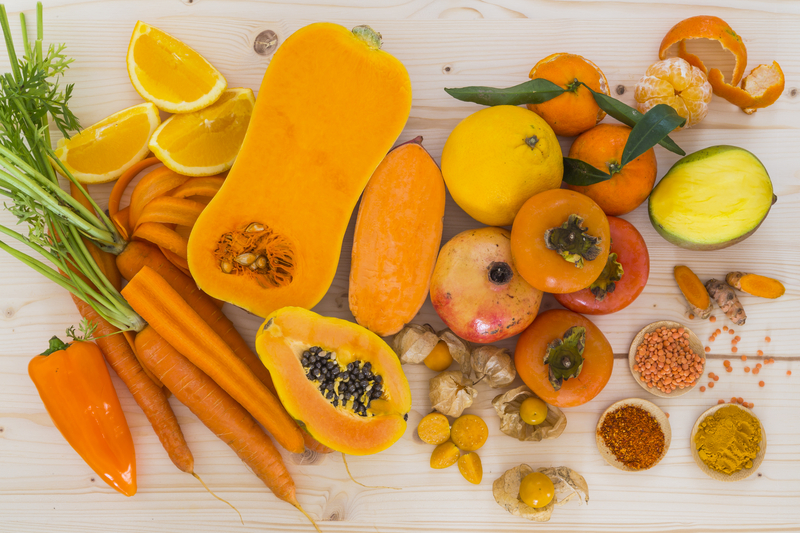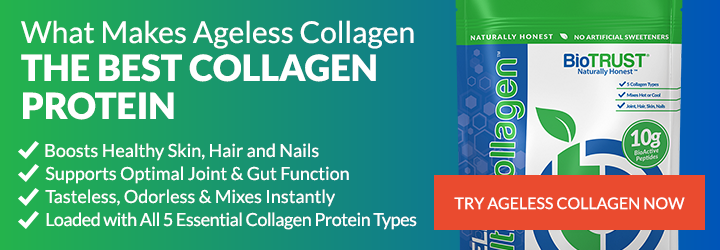14 Best Foods To Boost Collagen Production In Your Body

There’s a lot of buzz around collagen—and for good reason! It’s been shown to support healthy-looking skin, hair, nails, joints, bones, tendons, ligaments, muscles. Unlike many of the nutrition fads that come and go, this is one that has earned its hype—and then some. The most common dietary sources of collagen protein are collagen protein powders and bone broth (as it’s primarily found in the connective tissues, such as the skin and bones, of animals), and both are worth considering to ensure you get enough collagen in your diet. Even so, you can also support your body’s natural production of collagen by including collagen-boosting foods as part of your healthy diet.
Why Collagen Matters
Collagen is a key protein that holds the body together. It’s found throughout the body in connective tissues, such as joints and skin, where it is necessary for elasticity (i.e., it helps the skin stay structured to avoid sagging and looking older before its time). It is also a key component of the lining of the gut, which is vital for healthy digestion, healthy immune system function, and more.
Fortunately, the body is able to make its own collagen, and the food you eat plays a critical role in ensuring your body has all the materials it needs to do so. Sadly, though, as you get older, the body is less efficient at this process. So, as we age, it’s even more important to ensure we eat the best foods to boost collagen to make up for the decline. These foods may not even contain collagen protein, but they provide nutrients our bodies need to make collagen.
Top 15 Collagen-Boosting Foods
What foods are the best foods to boost collagen? Glad you asked! Here are our top 14:
1. Citrus and other vitamin-C-rich fruits are key collagen-boosting foods, as vitamin C plays a primary role in the synthesis of collagen. This nutrient is also helpful as it neutralizes free radicals, which break down both collagen and elastin. To ensure you’re consuming enough vitamin C, you’ll want a wide variety of vitamin-C-rich foods like oranges, lemons, grapefruit, and other citrus fruits.
2. Citrus isn’t the only fruit in town when it comes to vitamin C. Berries, including blackberries, blueberries, raspberries, and strawberries, are also rich in the collagen-boosting vitamin. In fact, per ounce, strawberries are even higher in vitamin C than oranges. Vitamin C can also be found in tropical fruits like guava, kiwi, mango, and pineapple.
3. Leafy greens, like kale, spinach, arugula, Swiss chard, and cabbage, as well as other vegetables— like broccoli, Brussel sprouts, red and green bell peppers, cabbage, potatoes (both sweet and white), tomatoes, and winter squash—also provide a good dose of vitamin C. The leafy greens also provide chlorophyll, making them some of the best foods to boost collagen. Why chlorophyll? Because it helps increase levels of the precursor of collagen in the skin.
4. Because of its high sulfur content, garlic is also one of the best collagen-boosting foods. A trace mineral, sulfur may both help with the production of collagen protein as well as help decrease the breakdown of collagen in the body.
5. Another nutrient vital for helping restore and regenerate damaged collagen is vitamin A. Look for orange-colored vegetables, like carrots and sweet potatoes, to provide this nutrient and help boost collagen.
6. Spirulina is a high-protein plant food that provides amino acids, including glycine, which is one of the primary amino acids that make up collagen. The dried, powder form of this nutrient-dense super food can easily be added to smoothies, juices, and desserts to help boost collagen.
7. Oysters and some other types of seafood (e.g., lobster) provide trace minerals like zinc and copper, which are also needed to activate molecules necessary for collagen synthesis.
8. Alaskan cod is another fish that provides nutrients to boost collagen, including the amino acids glycine and proline, as well as micronutrients like selenium, vitamin B6, and phosphorus. Other quality collagen-boosting seafood to include in the diet include wild-caught salmon, sardines, mackerel, and tuna. To ensure you get the most collagen from your fish, keep the skin on.
9. Meat, including beef and organ meat, provides the essential amino acids needed to make up collagen to help boost collagen production. Cuts that include bone and/or connective tissue (like a ribeye) can be especially rich in collagen.
10. Poultry and fowl, like chicken, turkey, duck, and other feathered foods, are rich sources of collagen, especially when you cook up a whole bird, which includes all the skin and bones (e.g., wings and drumsticks). If you do roast the whole bird, after you’ve removed most of the meat from the bone, you can place the remaining bones into a crockpot with water, herbs, and vegetables to simmer for homemade bone broth, which can then be used for a collagen-rich hearty soup.
11. Eggs are high in the amino acids proline and glycine, amino acids needed to produce collagen in the body. As an added bonus, the eggshell membrane (between the shell and the white when eggs are hard-boiled) is a good source of collagen protein.
12. If you’re looking for the amino acids needed to synthesize collagen but you’re not much of a meat eater (or you’re vegetarian or vegan), then you’ll need to make sure you’re consuming plenty of plant-based protein, such as including beans and legumes in your diet. Beans provide protein as well as copper, which are both needed for collagen production. Chickpeas may be especially beneficial as they’re high in both zinc and vitamin C as well as protein. Keep in mind, however, there are NO plant-based sources of collagen protein, and no plants contain the exact same combination of amino acids found in collagen protein. What’s more, no plants contain the amino acid hydroxyproline, which is specific to collagen protein and may actually serve as a “trigger” telling the body to build more collagen when you consume it (via collagen protein) in your diet.
13. Another food rich in the mineral zinc, which is important for the synthesis of collagen, is pumpkin seeds, which provide ~19% of the recommended daily value. Cashews, almonds, and sesame seeds are also good sources of the collagen-promoting minerals zinc and copper.
14. Fermented foods may not boost collagen production, but they may help prevent the breakdown of collagen by providing the probiotic Lactobacillus. This family of probiotics is known to produce superoxide dismutase, which is a strong antioxidant. Some fermented foods to include in the diet are yogurt, sauerkraut, kombucha, and tempeh.
Collagen is one of the most important proteins in the body. To boost this “fountain of youth” compound, ensuring you consume collagen through the diet or supplementation is important. But it’s also vital to support the body’s natural production, and the above 14 collagen-boosting foods can help provide the nutrients to do just that.







